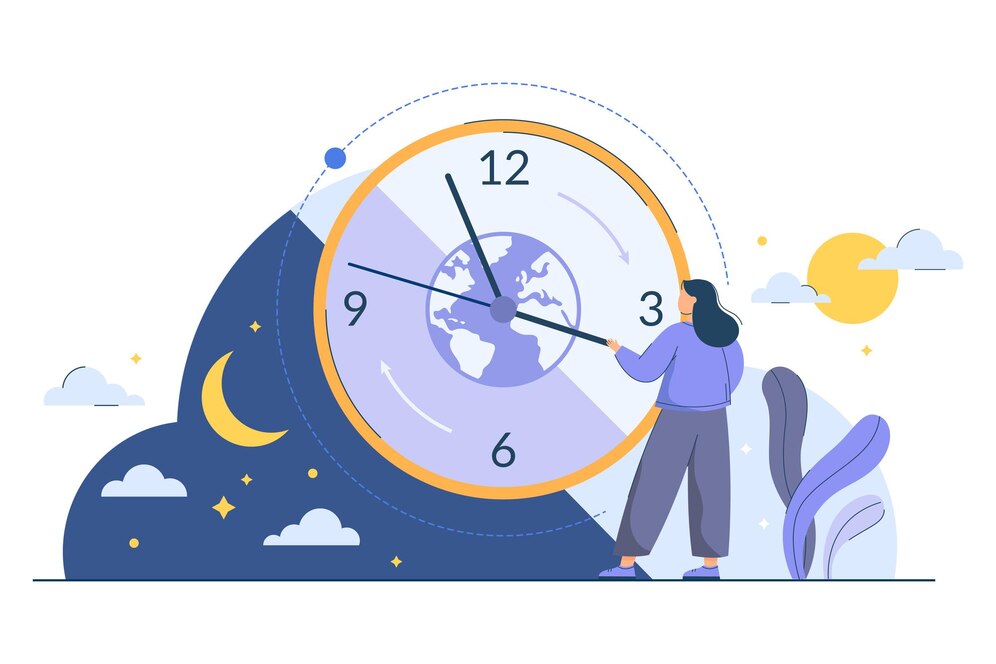Introduction to Circadian Rhythm
Definition
Circadian rhythm refers to the natural, internal process that regulates the sleep-wake cycle and repeats roughly every 24 hours. This biological clock is influenced by external cues such as light and temperature and is vital for maintaining overall health and well-being.
Importance
Understanding circadian rhythm is crucial because it affects various aspects of health, including sleep patterns, hormone release, eating habits, and body temperature. Disruptions to this rhythm can lead to numerous health issues, highlighting the need for synchronizing daily activities with our internal clock.
The Science Behind Circadian Rhythms
Biological Mechanisms
Circadian rhythms are controlled by the suprachiasmatic nucleus (SCN), a group of cells in the hypothalamus that respond to light signals from the eyes. The SCN regulates the production of melatonin, a hormone that promotes sleep, and coordinates with peripheral clocks in other organs to maintain physiological balance.
Key Components
- Suprachiasmatic Nucleus (SCN): The master clock that coordinates all circadian rhythms in the body.
- Melatonin: A hormone produced by the pineal gland that induces sleepiness.
- Peripheral Clocks: Internal clocks located in various tissues and organs that align with the SCN to regulate functions like digestion and metabolism.
How Circadian Rhythms Affect Sleep
Sleep-Wake Cycle
The circadian rhythm dictates the timing of sleepiness and wakefulness throughout the day. Typically, melatonin levels rise in the evening, leading to increased sleepiness, and decrease in the morning, promoting wakefulness.
Impact on Sleep Quality
A well-regulated circadian rhythm ensures restorative sleep by synchronizing the body’s sleep stages. Disruptions to this rhythm, such as irregular sleep schedules or exposure to light at night, can lead to poor sleep quality and insomnia.
Circadian Rhythms and Physical Health
Immune System
Circadian rhythms play a role in regulating the immune system. Certain immune responses are stronger at specific times of the day, which can influence the body’s ability to fight infections and heal wounds.
Metabolism
The timing of food intake in relation to circadian rhythms affects metabolism and energy balance. Eating at irregular times can disrupt metabolic processes, potentially leading to weight gain and metabolic disorders.
Cardiovascular Health
Blood pressure and heart rate follow a circadian pattern, typically rising in the morning and decreasing at night. Disruptions to this pattern can increase the risk of cardiovascular diseases such as hypertension and heart attacks.
Circadian Rhythms and Mental Health
Mood Disorders
Circadian rhythm disruptions are linked to mood disorders like depression and bipolar disorder. Proper alignment of circadian rhythms can improve mood stability and overall mental health.
Cognitive Function
Circadian rhythms influence cognitive functions such as memory, attention, and decision-making. Optimal cognitive performance is typically achieved when tasks are aligned with the body’s natural energy peaks.
Stress Management
A synchronized circadian rhythm helps regulate the body’s stress response. Disruptions can lead to increased stress levels and difficulty managing stress effectively.
Factors That Influence Circadian Rhythms
Light Exposure
Light is the most significant external cue affecting circadian rhythms. Exposure to natural light during the day and minimizing artificial light at night helps maintain a healthy rhythm.
Meal Timing
Eating meals at regular times supports the synchronization of peripheral clocks with the central clock, aiding in digestion and metabolism.
Physical Activity
Regular physical activity, especially during daylight hours, reinforces circadian rhythms and promotes better sleep.
Common Circadian Rhythm Disorders
Delayed Sleep Phase Disorder
Characterized by a delay in the sleep-wake cycle, causing difficulty falling asleep and waking up at conventional times. This disorder is common among adolescents and young adults.
Advanced Sleep Phase Disorder
Marked by an advanced sleep-wake cycle, leading to early evening sleepiness and early morning awakenings. This disorder is more prevalent in older adults.
Shift Work Disorder
Occurs in individuals who work non-traditional hours, disrupting their natural sleep-wake cycle. Symptoms include insomnia, excessive sleepiness, and difficulty maintaining a consistent sleep schedule.
How to Optimize Your Circadian Rhythm
Light Therapy
Using light therapy, especially in the morning, can help regulate circadian rhythms by simulating natural sunlight and reducing melatonin levels.
Consistent Sleep Schedule
Maintaining a regular sleep schedule, even on weekends, helps reinforce your circadian rhythm, leading to better sleep quality and overall health.
Diet and Nutrition
Eating a balanced diet at regular intervals supports circadian rhythms. Avoiding heavy meals close to bedtime can prevent disruptions to sleep.
Circadian Rhythm in Different Age Groups
Infants
Infants gradually develop their circadian rhythms over the first few months of life. Exposure to natural light and establishing a consistent bedtime routine can help regulate their sleep patterns.
Adolescents
Adolescents often experience a natural delay in their circadian rhythms, leading to later bedtimes and wake times. Encouraging healthy sleep habits and limiting screen time before bed can support better sleep.
Adults
Adults should aim to synchronize their activities with their circadian rhythms, including maintaining regular sleep schedules and getting adequate daylight exposure.
Elderly
Circadian rhythms can become weaker with age, leading to earlier bedtimes and wake times. Light exposure and physical activity can help strengthen circadian rhythms in older adults.
Technology and Circadian Rhythm
Impact of Blue Light
Exposure to blue light from screens in the evening can interfere with melatonin production and disrupt sleep. Using blue light filters and limiting screen time before bed can mitigate these effects.
Sleep Tracking Devices
Sleep tracking devices can provide insights into your sleep patterns and help you adjust your habits to align better with your circadian rhythm.
Circadian Rhythm and Work Performance
Productivity
Aligning work tasks with your natural energy peaks can enhance productivity and performance. Morning tasks may be more effectively accomplished by early risers, while night owls might perform better later in the day.
Error Reduction
Following your circadian rhythm can reduce the likelihood of errors and accidents, especially in tasks requiring concentration and precision.
Managing Shift Work
For shift workers, maintaining a consistent schedule, using light therapy, and taking strategic naps can help manage the effects of circadian rhythm disruptions.
Natural Ways to Support Your Circadian Rhythm
Morning Sunlight
Exposure to natural sunlight in the morning helps reset your circadian rhythm and promotes wakefulness.
Evening Relaxation Techniques
Engaging in relaxation techniques such as reading, meditating, or taking a warm bath in the evening can help signal your body that it’s time to wind down.
Limiting Caffeine
Limiting caffeine intake, especially in the afternoon and evening, can prevent disruptions to your circadian rhythm and improve sleep quality.
The Role of Chronotypes in Circadian Rhythm
Morning Larks
Morning larks, or early risers, have a circadian rhythm that naturally leads to earlier wake times and bedtimes. They typically feel more energetic in the morning.
Night Owls
Night owls have a circadian rhythm that causes them to feel more awake and alert later in the day. They often go to bed and wake up later than morning larks.
Understanding Your Chronotype
Understanding whether you are a morning lark or a night owl can help you schedule your activities to match your natural energy levels, improving productivity and well-being.
Circadian Rhythm and Travel
Jet Lag
Jet lag occurs when your internal clock is out of sync with a new time zone. Symptoms include fatigue, difficulty concentrating, and digestive issues.
Adjusting to New Time Zones
Gradually adjusting your sleep schedule before traveling, staying hydrated, and seeking natural light exposure in the new time zone can help mitigate the effects of jet lag.
Tips for Frequent Travelers
Frequent travelers can benefit from maintaining a consistent sleep schedule, using light therapy, and taking short naps to manage circadian rhythm disruptions.
Future Research and Developments
Innovative Therapies
Research into innovative therapies, such as targeted light therapy and chronopharmacology (timing medication to align with circadian rhythms), is ongoing and promises to offer new ways to optimize circadian health.
Emerging Technologies
Emerging technologies, including advanced sleep trackers and personalized health apps, provide more detailed insights into individual circadian rhythms and offer tailored recommendations for improvement.
FAQs About Circadian Rhythm
What is a circadian rhythm?
A circadian rhythm is a natural, internal process that regulates the sleep-wake cycle and repeats roughly every 24 hours.
How does light affect circadian rhythms?
Light exposure, particularly natural sunlight, plays a crucial role in synchronizing circadian rhythms by influencing the production of melatonin, a hormone that regulates sleep.
Can circadian rhythms affect my mood?
Yes, disruptions in circadian rhythms are linked to mood disorders such as depression and bipolar disorder. Maintaining a regular rhythm can improve mood stability.
How can I reset my circadian rhythm?
You can reset your circadian rhythm by getting consistent exposure to natural light, maintaining a regular sleep schedule, and avoiding screen time before bed.
What are common circadian rhythm disorders?
Common disorders include Delayed Sleep Phase Disorder, Advanced Sleep Phase Disorder, and Shift Work Disorder, each affecting the timing of sleep and wakefulness.
How do circadian rhythms change with age?
Circadian rhythms can shift with age, often leading to earlier bedtimes and wake times in older adults. Light exposure and physical activity can help maintain regular rhythms.
Understanding and optimizing your circadian rhythm is essential for maintaining overall health and well-being. From sleep quality and physical health to mental well-being and productivity, our internal biological clock plays a crucial role in regulating various aspects of daily life. By aligning your activities with your natural rhythms, practicing good sleep hygiene, and using tools like light therapy and sleep tracking devices, you can enhance your circadian health and improve your quality of life. Embrace the science of circadian rhythms and discover a path to better health and optimal daily functioning.
Disclaimer: The information provided in this article on circadian rhythm is for educational and informational purposes only. It is not intended as a substitute for professional medical advice, diagnosis, or treatment. Always seek the advice of your physician or other qualified health providers with any questions you may have regarding a medical condition or health objectives.

David M is a seasoned author renowned for his expertise in health tips and homemade remedies. With a passion for wellness, he diligently researches and meticulously analyzes a plethora of online resources, ensuring their credibility. David’s dedication shines through as he curates invaluable information, catering to health enthusiasts.










